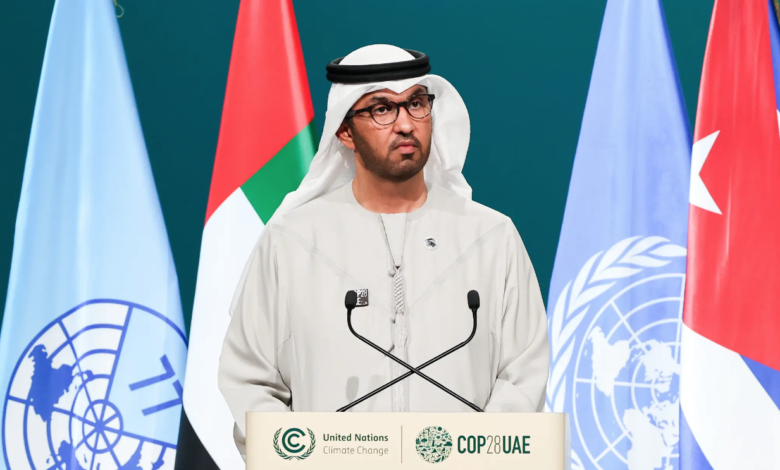The Stop fossil fuels “is not supported by science”: Cop28 throws the mask

A phase-out agreement “would get us back into the caves,” al-Jaber said
The request to stop fossil fuels “is not supported by science”. This was said by the president of COP28 in Dubai, the Emirate Sultan al-Jaber, during a public video conference a few days before the climate conference. The statement circulated yesterday and raised doubts about the transparency and honesty of the COP presidency. The first climate summit to be led by one of the leading representatives of the oil and gas industry: al-Jaber is also the number 1 of ADNOC, the Emirati state oil company, and one of the fossil companies with the largest investment plans in the future development of new deposits.
What the president of COP28 said
“There is no science, no scenario, that claims that the phasing out of fossil fuels is what will make it possible to reach 1.5°C,” al-Jaber said in response to Mary Robinson, the former UN Special Envoy for Climate Change and one of the architects of the Paris Agreement. “Show me the roadmap for the phasing out of fossil fuels that will allow for sustainable socio-economic development, unless you want to get the world back into the caves,” al-Jaber said.
A position that seems to bury any possibility of including the phase-out of fossil fuels in the final decision of the COP28 climate conference.
What does science say
Statements that do not correspond with the scenarios outlined by climate science and major international agencies.
UN Secretary-General Antonio Guterres has been repeating this for years, and in recent months with increasing insistence. Based on reports from major Glass Palace agencies, starting with UNEP. Still on 1 December, opening the works of the COP28, Guterres said that “the science is clear: the limit of 1.5 C is only possible if we eventually stop burning all fossil fuels. Do not reduce, do not break down. Phasing out, with a clear schedule”.
It is the same message launched by the Production Gap Report that UNEP published in early November. At the current rate, reads the document, in 2030 we will produce twice as many fossil fuels as the volumes compatible with compliance with the threshold of 1.5 degrees. In order not to overshoot it, according to UNEP, “a combined reduction in the production and use of oil and gas by three-quarters by 2050 on 2020 levels, at least”. And to get on the right trajectory, we need a global agreement on the phase-out at COP28.
On the same wavelength also the International Energy Agency (IEA). In the update of its Zero Net Emissions Roadmap by 2050, one of the most balanced and realistic reports even by much of the fossil industry, this year the IEA wrote that to hit 1,5 °C any new development of new oil and gas fields must be stopped immediately. This coincides with the idea of a phase-out, although the route traced by the Agency still provides a role for fossils in the mid-century.
Stop fossil fuels is still an option
Al-Jaber’s words weigh heavily on the progress of the negotiations. For a “technical” reason: it is the rotating presidency that prepares and proposes to the states the drafts of the final decision of the summit. And he can freely decide what to put in it and what to leave out.
In theory, the presidency would be required to prepare drafts reflecting the positions expressed by the countries, trying to reach compromises acceptable to all. The Cop process works by consensus, so every state has, in fact, the right of veto. In drafts, therefore, very often more alternative options are contained, and inserted in square brackets. It is on these options that we then work during the negotiations.
Currently, the last draft of the text still presents both possible options: both the phase-out, that is, the phase-out, and the phase-down, that is, the gradual reduction. But it is not unlikely that, despite dozens of countries asking for the phase-out, in the coming days the Emirate presidency will decide to eliminate this alternative, presenting the phase-down as the only possible compromise. On the other hand, last year at COP27 the Egyptian Presidency refused directly to include the phase-out as an option in the text, even though almost 100 states out of just under 200 participating in the summit were asking for it.
Towards a phase-down of production by 2030?
That this is a concrete possibility is also said by the moves made by the Emirates these days. On 1 December, the UAE and the IEA presented the results of the high-level dialogue conducted in the weeks leading up to the start of COP28. This is a kind of first possible compromise on the main dossiers under discussion at the summit.
And the document speaks exclusively of the phase-down. Even if it goes beyond the positions supported by countries that only push for a reduction because it specifies that it must also concern production, not only consumption. And that the decline in production must take place by 2030.





